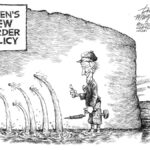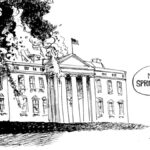
Facing Starvation, Desperate Venezuelans Flee by Boat
Facing crushing inflation, severe food and medicine shortages, widespread poverty, and forced labor, some Venezuelans have decided to make the dangerous 60-mile sea journey to the island of Curaçao.
When 30-year old Roymar Bello boarded a rickety ship in hopes of finding a better life on the island, she wasn’t prepared to swim.
As the crowded vessel neared Curaçao, the captain (a smuggler) forced all 17 passengers into the water and told them to swim. Roymar was starting to drown when a fellow migrant grabbed her and towed her to the rocky shore.
In addition to drowning, migrants face coast guard vessels and gangs of armed boatmen looking to capture them and send them home.
“It was worth the risk,” said Bello. People like her “are going after one thing: food.”
The Bello family is now split between Venezuela and Curaçao, with one uncle sitting in jail accused of smuggling and Roymar’s brother’s 19-year-old pregnant girlfriend Yaisbel secretly taking loans from smugglers to get her boyfriend to the island.
Roymar’s mother Maria Piñero has attempted the crossing twice: once in September and again in October. The first journey ended when the captain turned around and fled after a close brush with the coast guard.
The second journey ended when Piñero and 12 other passengers were located and captured by the coast guard. Piñero was detained, and her son Rolando will be forced to shell out the cash to send her back to Venezuela before he can start saving money to bring her back in secret.
PB has followed the humanitarian crisis in Venezuela for many months, pinning the food shortages, inflation, and general economic collapse on the socialist policies propagated by Hugo Chavez and his successor Nicolás Maduro.
As we wrote in a previous article, oil-rich Venezuela should be a wealthy nation. But socialism does not and will never work.
In the past year, over 150,000 Venezuelan citizens have left the country. This massive exodus is referred to as the “second diaspora,” the first diaspora having occurred during Chavez’s presidency.
Nearly 60% more Venezuelans have fled the country during 2016 than the previous year, and the situation grows worse every day.
“Parents will say, ‘I would rather say goodbye to my son in the airport than in the cemetery,’” explains Tomás Páez, a professor of immigration studies at the Central University of Venezuela.
Tens of thousands of Venezuelans have crossed the Amazon Basin to get to Brazil. Others attempt to sneak through Caribbean airports into countries that once accepted them without argument.
When Colombia opened its border with Venezuela for two days in July, a whopping 120,000 people streamed in just to purchase food and supplies.
In a move disturbingly reminiscent of the migrations from Cuba to the US that occurred during the 60s, 70s, and 80s, Venezuelans are now risking dangerous sea voyages to nearby islands.
“The earnings of these people are low,” laments Iván de la Vega, a sociologist at Simón Bolívar University in Caracas. “The only option left to them is the nearby countries, ones they can get to on foot, or by rafts, or go on boats with tiny motors.”
The collapse has created a completely new class of poor Venezuelans who have given up on professional jobs for uncertain lives abroad.
“We’re at the start of an unprecedented humanitarian crisis in this part of the Amazon,” explains Col. Edvaldo Amaral, Civil Defense Chief of the Brazilian state of Roraima.
Roughly 30,000 Venezuelans have moved into this region since 2015, and the Brazilian Army has responded by strengthening border patrols. “We’re already seeing Venezuelan lawyers working as supermarket cashiers, Venezuelan women resorting to prostitution, indigenous Venezuelans begging at traffic intersections,” continues Amaral.
Caribbean islands like Aruba and Curaçao are even loss hospital, their small landmasses simply unable to absorb the vast number of Venezuelans seeking entry.
Unemployment on Curaçao is already at 11%, and locals fear that migrants will undercut the local labor force. “We have only a limited capacity to deal with refugees,” admits Curaçao legislator Alex Rosaria.
Others are worried about violence, and the island’s Justice Minister insists that the increase in Venezuelan migrants has caused a 15% increase in crime. “My preoccupation is what kind of people are entering Curaçao,” he said.
Both Aruba and Curaçao have officially closed their borders to migrants unless they can show $1,000 – which is more than five years of earnings for the average Venezuelan.
The Dutch Caribbean Coast Guard has been tasked with catching migrants on their way to Curaçao, but the small fleet is able to catch less than 10% of the many boats coming over from Venezuela.
Editor’s note: Venezuela should be a massively rich country. It is crumbling because of it socialist government. This is the reality of socialism, no matter how rich you are, socialism will bring you to your knees.


























It won't happen. This is wishful MAGA thought.
I agree with your satire Frank!! But NC is a purple state and would not like your deal to surrender…
I agree. I hope you will read my response and comment.
This article gets at least a Stop the Spin rating of at least STS-5+. Here's why: 1) The charges against…
Curic///Another ultra rich East Coast Liberal Communist . Why do her and others like her wonder why we don't want…